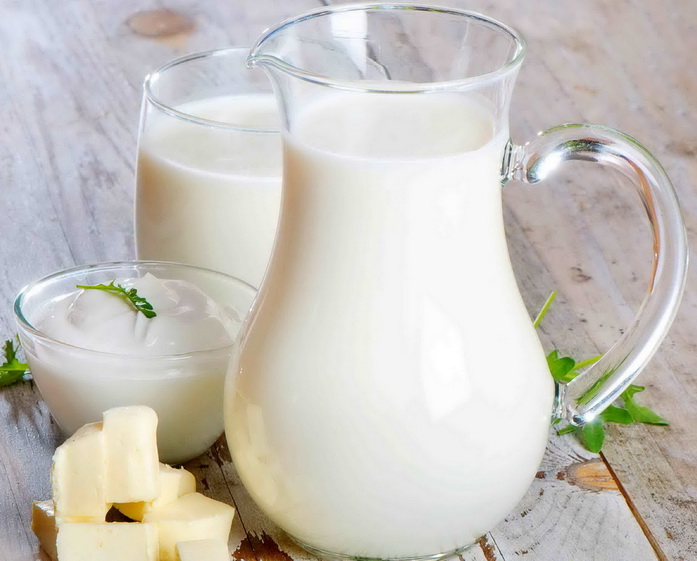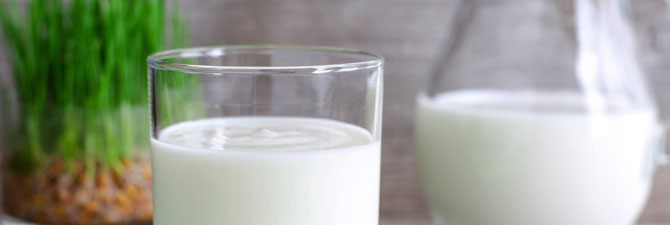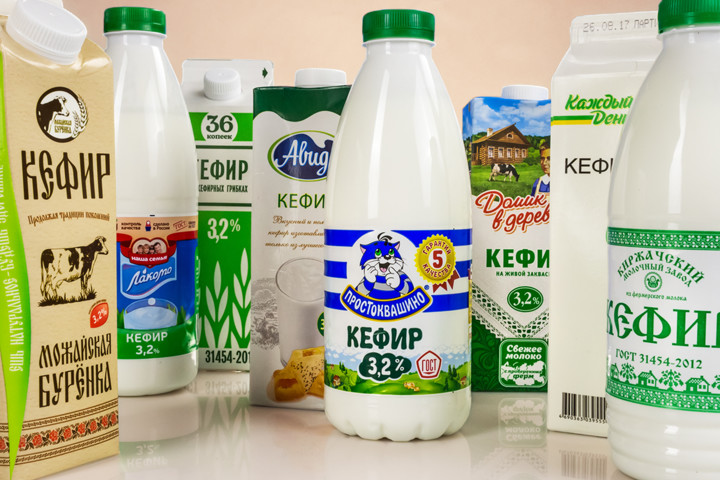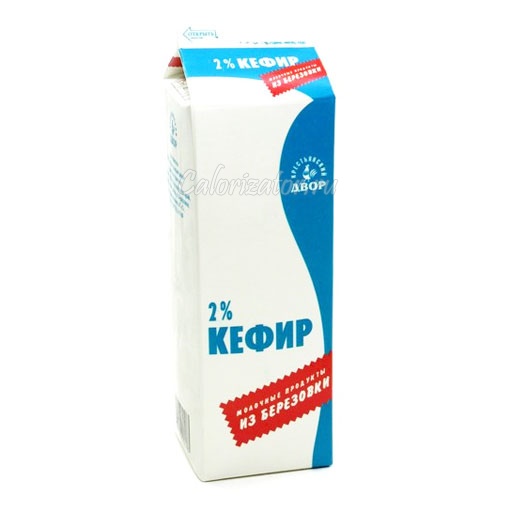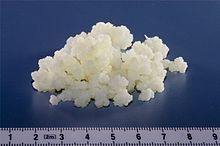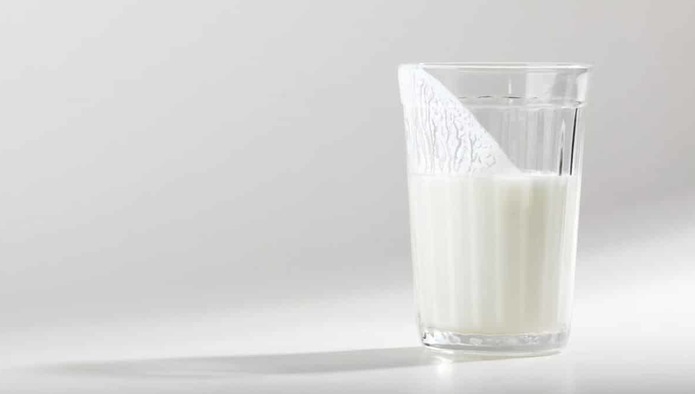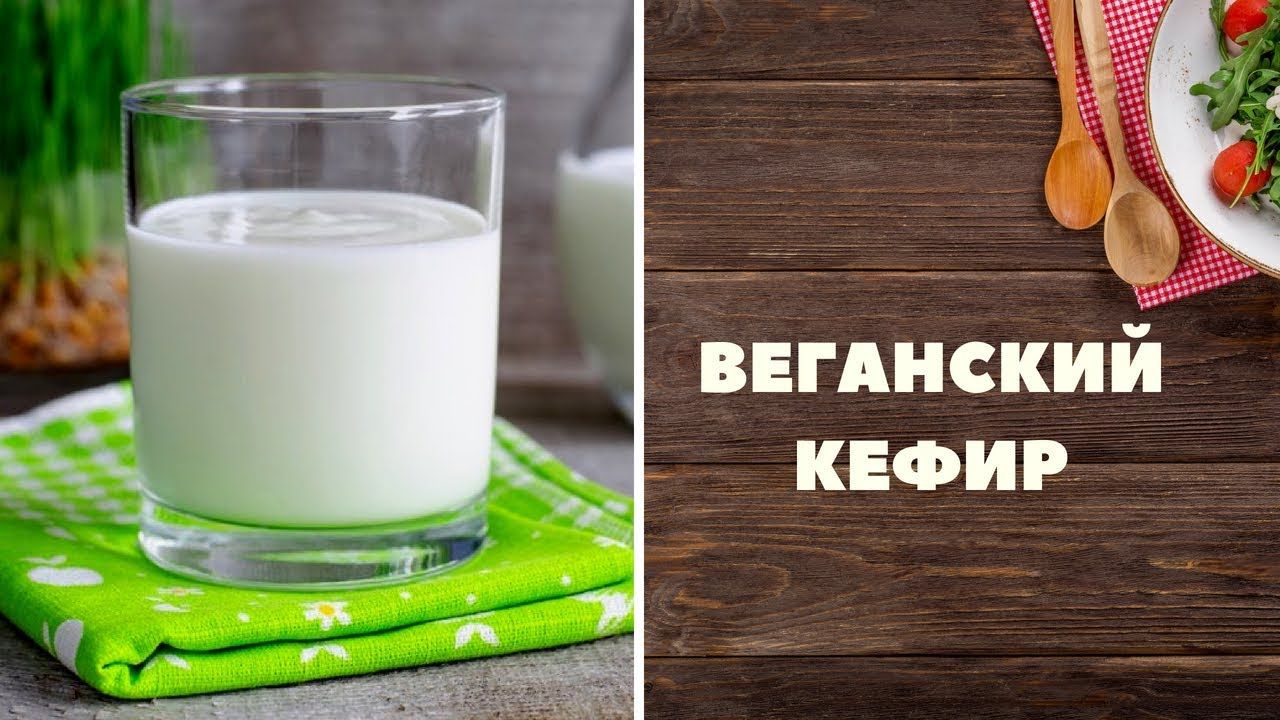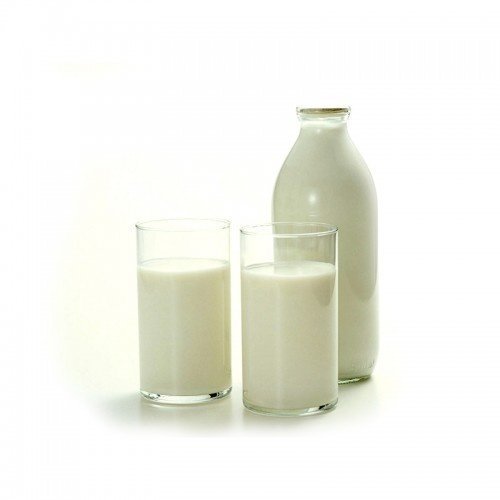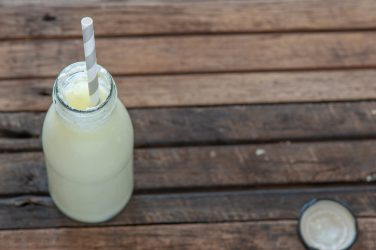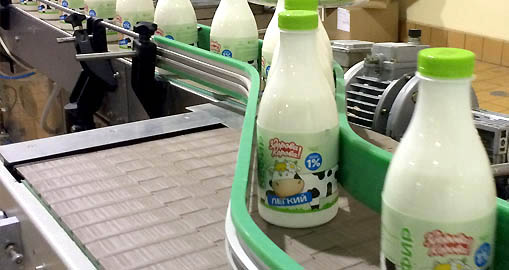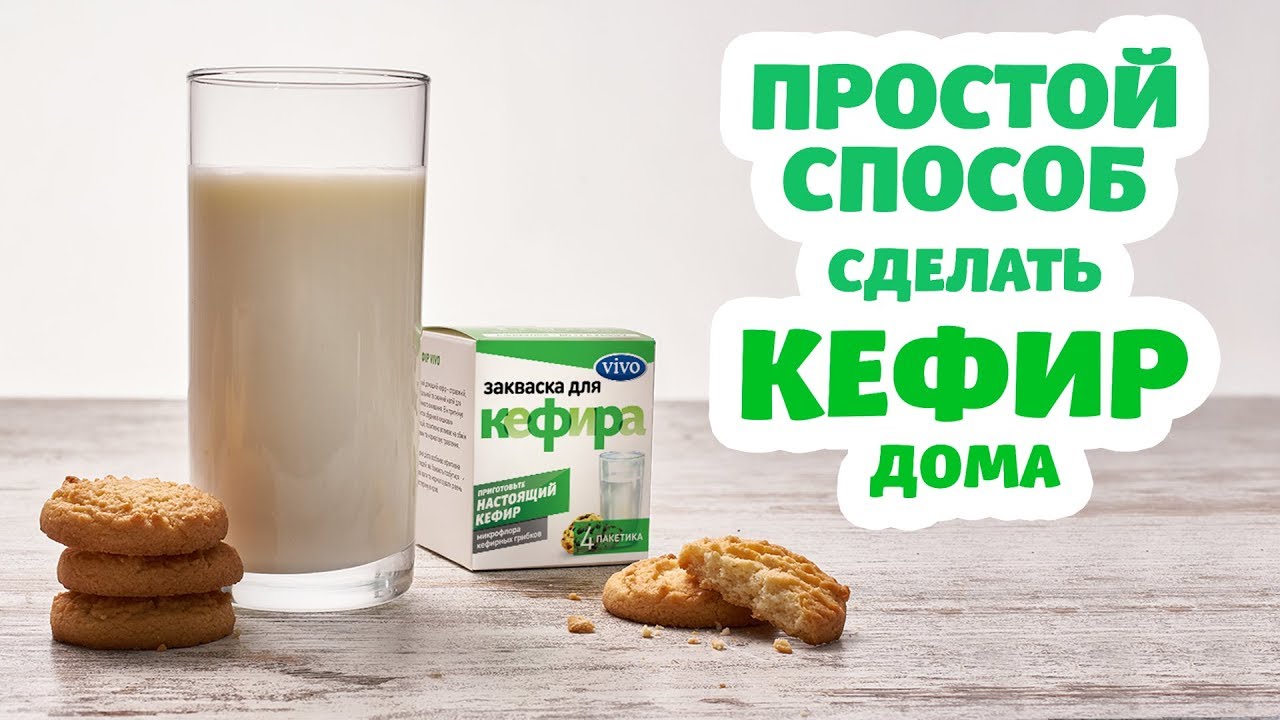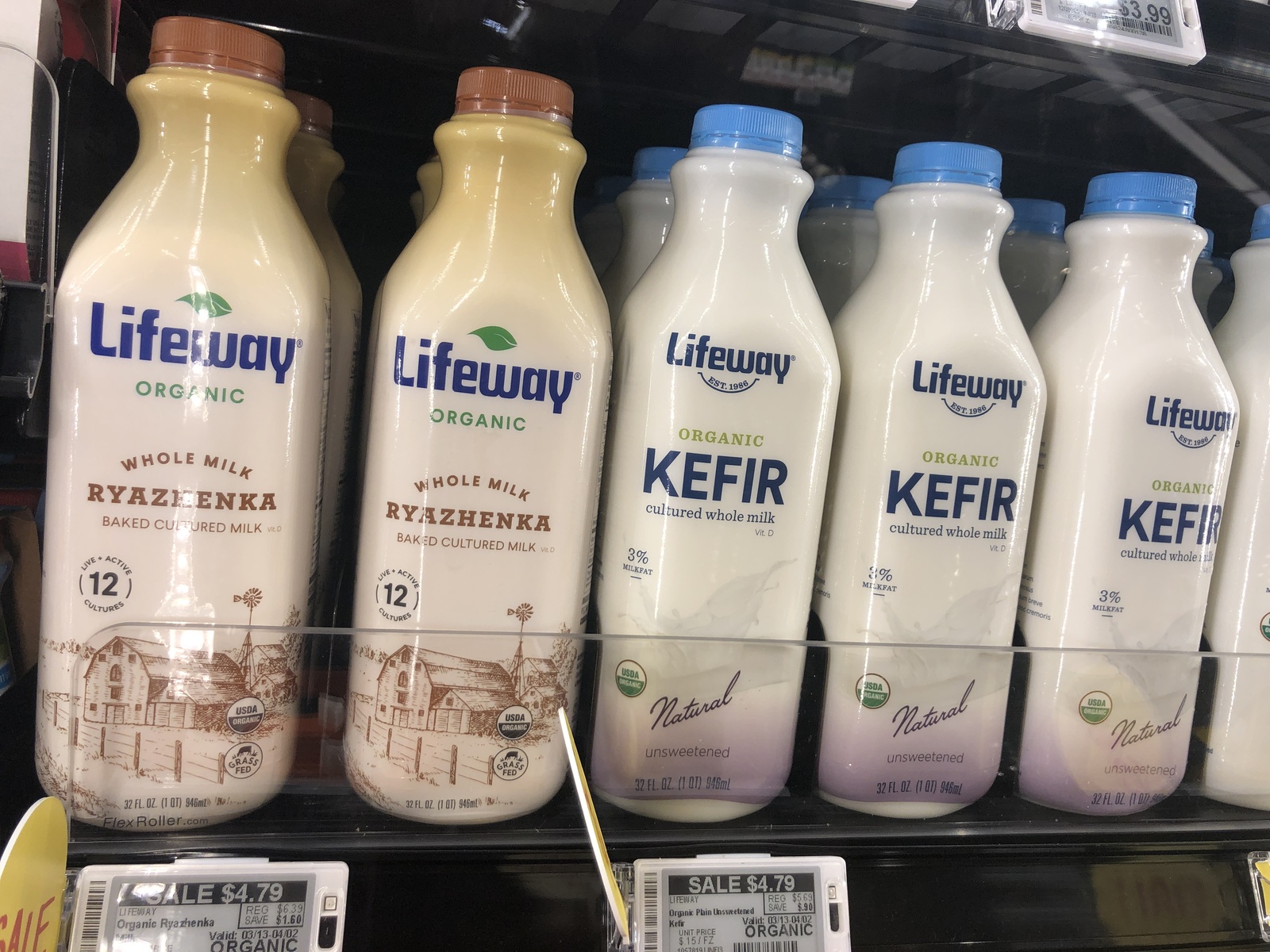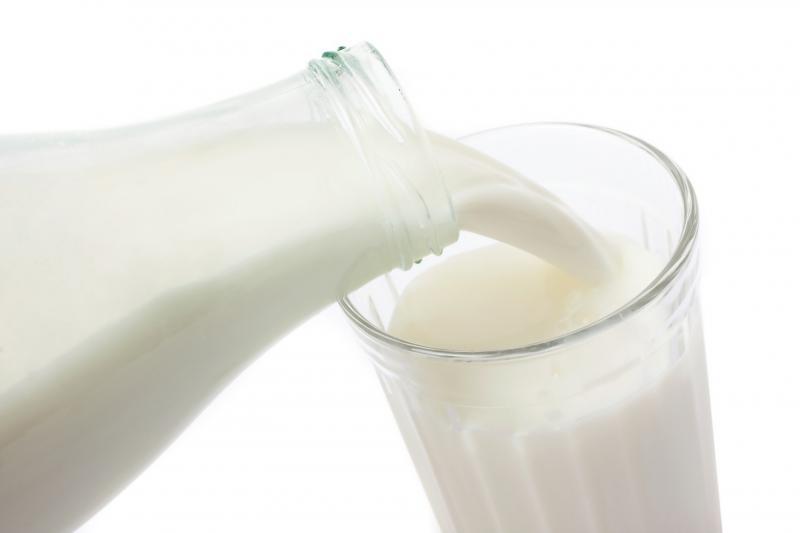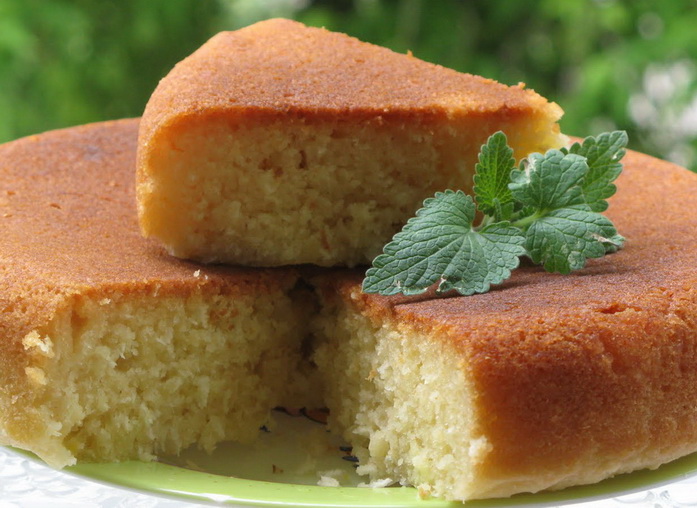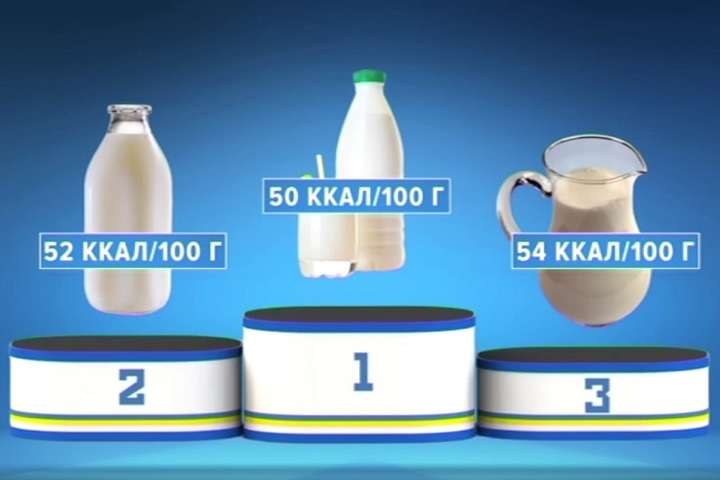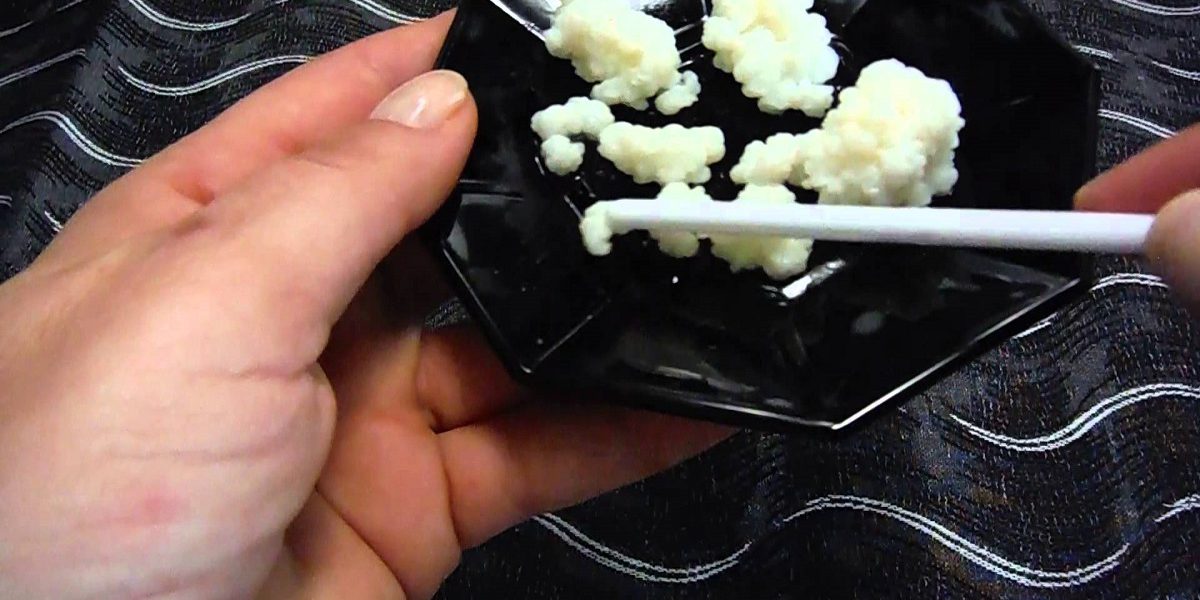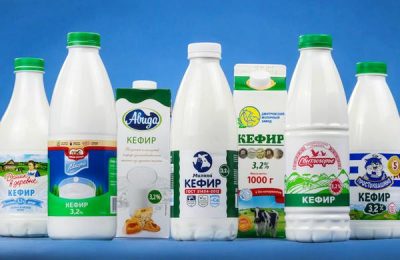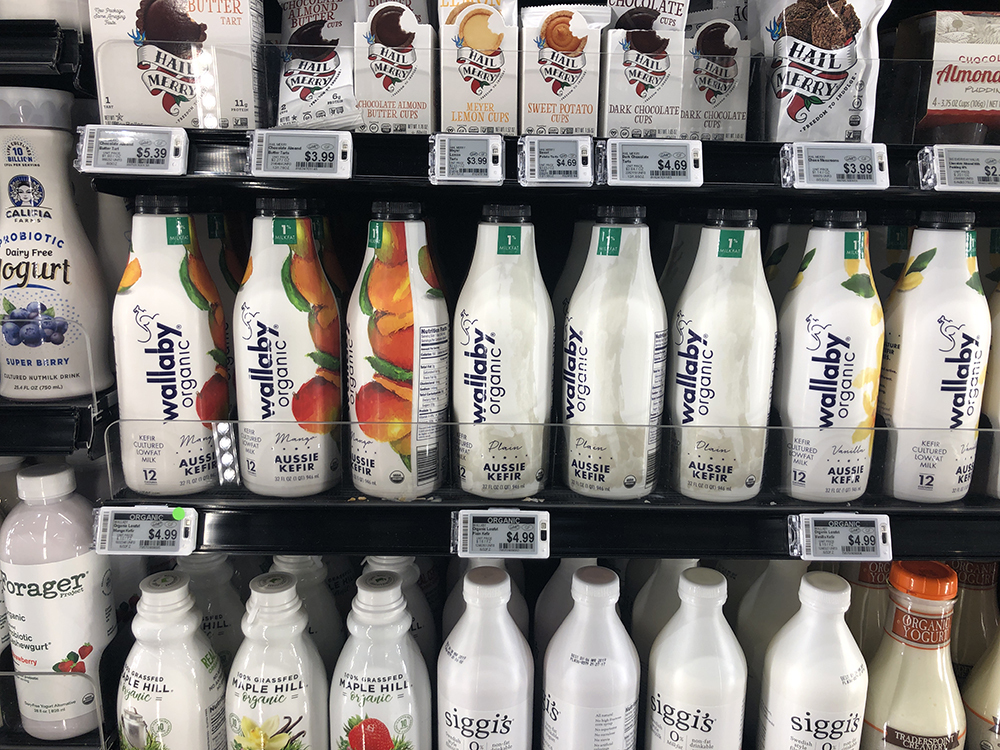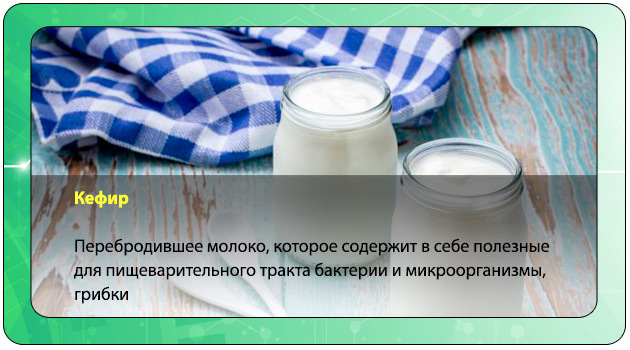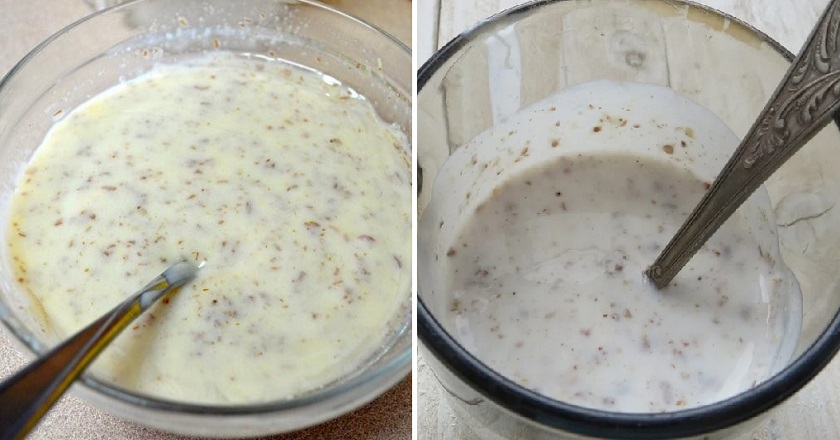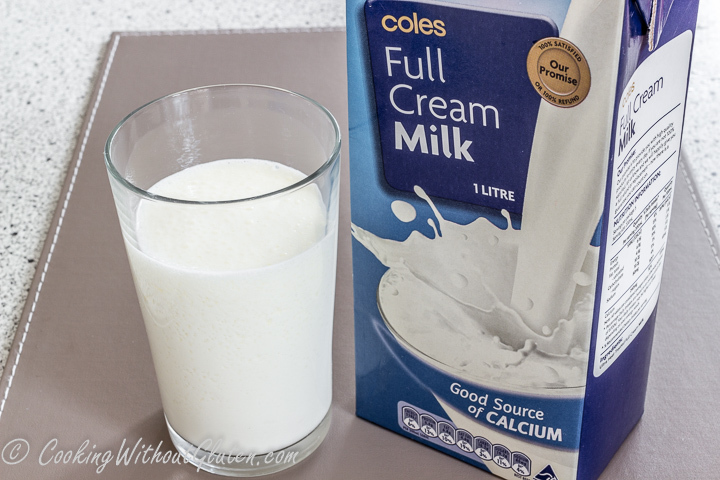How to choose kefir
It is best to buy kefir made on the same day. The packaging should not be swollen - this means that the product has been stored incorrectly or for a long time. Buy exactly kefir, and not a "kefir product" or other variations on a theme from the manufacturer.
The composition of kefir should be indicated as the simplest and most correct: milk and ferment on kefir fungi. Sweeteners, sugars, or other additives should not be present. At the end of the shelf life, beneficial bacteria should contain more than 10 million.
Kefir should not have a foreign smell. It should be white, uniform in consistency. Do not buy kefir with a long shelf life!
Another good option to get a 100% quality product is to cook it yourself. Read about how to do this in the article Homemade kefir - delicious, simple and very useful!
The most popular fermented milk product - kefir - is an excellent means for good digestion, aid in losing weight, a valuable ingredient in cosmetology. This is one of the important healthy food products, and if you have no contraindications, then you can drink kefir to a ripe old age, receiving only benefits from it.
I invite you to also read articles on the blog on related topics: The benefits and harms of cottage cheese Goat milk is the best dairy product for children and adults National drink kumis Ayran is a drink of long-livers of the Caucasus
And Mikhail Glinka will sound for the mood. Nocturne "Parting".
The composition and calorie content of kefir
Even I.I.Mechnikov linked the composition and benefits of kefir with its specific leaven. This is not to say that the composition of kefir is so rich that it can replace all other products. But this fermented milk drink has its own special biochemistry and therefore its own set of beneficial effects on the body.
Kefir contains:
- beneficial bacteria - probiotics;
- organic acids;
- amino acids;
- natural sugars;
- a set of vitamins - A, B1, B2, B3, B6, B9, B12, C, D, PP;
- minerals - calcium, phosphorus, magnesium, iron, iodine, potassium, selenium, etc.
Proteins, fats, carbohydrates in kefir are distributed as follows: 2.9 g, 3.2 g and 4 g, respectively, per 100 g of product. This ratio is for 3% kefir, it can vary depending on the fat content.
Kefir contains more calcium than milk. Of the carbohydrates, most of all lactose, part of which is converted into lactic acid - because of this, the product is so easy to digest. 1 ml of kefir contains about hundreds of millions of lactic bacteria, which contribute to normal digestion.
In terms of fat content, kefir is most often with a high content - 3.2%, 2.5%, with a low - 1% and fat-free - 0%. These indicators are important for healthy eating, diets, etc.
Calorie content of kefir
Kefir is produced by many manufacturers, and the composition of their products varies slightly. Also, the calorie content of kefir per 100 g depends on the fat content. Therefore, there are average values for the calorie content of kefir. But according to state standards, any kefir should contain at least 2.8 g of protein.
Table. Calorie content of kefir depending on fat content
| Fat content of kefir | Kcal / 100 g |
|---|---|
| 0% | 30 |
| 1% | 40 |
| 1,5% | 41 |
| 2% | 51 |
| 2,5% | 50 |
| 3,2% | 56 |
In 3.2% of kefir, the calorie content can reach 59 kcal. So the difference between fat-free and fatty kefir is not that great. Considering that we usually drink kefir in small portions, then the fat percentage will be important only for those who need to strictly take into account the calories consumed due to diet or other reasons.

Is it useful to drink kefir at night
This drink is suitable even for those who are on a diet. It is low in calories, high in protein, and easy to digest. After drinking a glass, you can dull hunger, having received a portion of nutrients. Fasting days on it will help cleanse the body, facilitate weight loss.It is best to drink the drink on an empty stomach, slightly chilled.
It is a great choice for breakfast. It improves the functioning of the nervous system, which means it charges you with energy. After sleeping, it will eliminate bad breath, and it also helps to improve appetite.
It is often advised to drink kefir at night.
Will it be beneficial or harmful? A glass of drink before bedtime improves digestion, reduces hunger, while not bringing in extra calories (this is especially important for those who are on a diet), improves sleep and assimilation of useful elements. However, drinking is important no later than an hour before bedtime.
But, if you have heartburn, belching, reflux disease, the product for the night is contraindicated for you.
Kefir in medicine
Kefir is a nutritious and healthy fermented milk product that allows you not only to satisfy your hunger, but also to have a beneficial effect on the systems in the body. Several medical problems stand out, when kefir is not only a way to satisfy hunger, but also an opportunity to alleviate the condition.
With diabetes mellitus
With diabetes mellitus, kefir is useful for the following reasons:
- decreases blood sugar;
- the work of the gastrointestinal tract improves;
- the general condition of the body improves;
- the immune system is strengthened.
With pancreatitis
With pancreatitis, kefir is useful because it reduces acidity and relieves inflammation. But with an exacerbation of the disease, it is contraindicated due to the alkaline structure. Only after a ten-day period, it is possible to restore the work of the pancreas with the help of fermented milk products. The main requirement is the minimum fat content of the product.
With gastritis
For the treatment of erosive gastritis, the use of kefir is indicated, since the acid-base structure has a beneficial effect on the functioning of the digestive system, eliminates inflammation in the stomach cavity, and also lowers the pH level.
For the intestines
Constipation or upset with severe cramps and pain in the intestines is a common problem arising from an unbalanced diet and lack of regimen. Drinking kefir daily on an empty stomach or at night before going to bed is an opportunity to "start" the stomach and remove toxins and toxins from the intestines. The elasticity of the intestinal walls improves, so problems such as bloating and flatulence are eliminated.
For constipation
Stagnation of organic waste in the body, and in the common people constipation, is a physiological problem that requires a prompt solution to avoid intoxication of the body. Regular drinking of kefir allows you to normalize the stool, avoiding digestive problems.
With gout
Kefir contains many useful trace elements, vitamins and minerals, therefore, the structure of bone tissue improves, thereby eliminating the pain of gout. But, given the high acidity of the product, you must first consult with your doctor in order to avoid adverse reactions.
With colitis
The situation is considered individually, since flatulence and intestinal lactose intolerance with colitis can cause a worsening of the condition
If, after drinking kefir, the state of health improves and the appearance of problems with the gastrointestinal tract is excluded, then it is important to include the product in the diet in order to saturate the body with useful micro- and macroelements
With hemorrhoids
For the treatment of hemorrhoids, the presence of at least 3 glasses of kefir in the diet is required, since it improves the microflora of not only the stomach, but also the intestines, therefore, the inflammatory syndrome is removed and the proliferation of hemorrhoids is prevented. A medium to high fat product is suitable due to a sufficient concentration of fats, proteins and carbohydrates.
With cholecystitis
Cholecystitis is an inflammatory process in the gallbladder that can be easily eliminated by eating foods with a moderate acid-base balance. Kefir is one of the most effective dietary products, therefore, irritation is removed and the general condition of the liver and gallbladder is normalized.
With stomach ulcers
Kefir helps to reduce acidity in the stomach, therefore, the general condition is facilitated and the work of the gastrointestinal tract is normalized. But low fat kefir is best suited, since it provides a mild effect on the body.
In case of poisoning
To remove the toxins that caused the poisoning, they use fatty kefir. It washes the stomach and intestines, including the removal of bacteria that provoke nausea, vomiting, cramps and general malaise of the body.
With heartburn
Kefir contains animal protein, so it neutralizes excess acidity, due to which heartburn is eliminated
But it is important to drink it in small sips so that gastric juice is gradually produced at an acceptable pH level.
With thrush
Fermented milk products, including kefir, contribute to the destruction of the Candida fungus, therefore, there is a destructive effect on thrush. It is recommended to drink kefir not only for treatment, but also as a prophylaxis, so as not to face such an unpleasant intimate problem.
Video: how to get rid of thrush without medication
Useful properties of kefir
The main benefit of kefir lies in its beneficial effect on the digestive system. Kefir fungus is a combination of different microorganisms, and they are very beneficial for the intestinal microflora. Probiotics prevent the development of pathogenic flora, help eliminate pathogens of gastrointestinal infections. Kefir is a proven remedy for dysbiosis, which is a frequent consequence of taking antibiotics. In comparison with milk, kefir is absorbed faster and better.
But this product may have other beneficial effects as well:
- supports the immune system;
- cleans the digestive tract, helps with constipation;
- stimulates the production of digestive juices;
- gives a moderate diuretic effect;
- normalizes metabolism;
- has a beneficial effect on muscles;
- useful in diabetes mellitus;
- replenishes the deficiency of calcium and phosphorus, which is beneficial for bones, hair and nails;
- good thirst quencher. Prevents dehydration, but does not retain excess fluid and therefore eliminates edema;
- low fat kefir lowers cholesterol levels;
- you can drink kefir if you are allergic to lactose;
- normalizes the nervous system (tryptophan gives relaxation), helps to restore healthy sleep, eliminates chronic fatigue;
- there is evidence of a reduction in the risk of cancer.
You can find information that kefir reduces the risk of atherosclerosis with daily use. Kefir is easy to digest, therefore it is advised to drink it for elderly people and those who are recovering from an illness. Experts recommend this product for a balanced, healthy diet.
The benefits and harms of low-fat kefir are a common question. Its benefits are lightness for the body, a minimum of calories and other beneficial effects. There is no particular harm, but fats are needed to assimilate a number of useful substances.
Kefir in cosmetology
The benefits of kefir for the skin and hair are widely known. It contains alpha hydroxy acids - compounds that are good for the skin and eliminate wrinkles. Kefir masks can be prepared for different skin types. The product cleanses the skin, promotes its freshness, gives a whitening effect.
Amino acids provide nourishment and hydration to the skin. Kefir is a natural antioxidant and promotes skin rejuvenation. The product also regulates the acid-base balance of the skin.
Kefir is an affordable hair care product. It nourishes the hair, restores and strengthens its structure. Kefir is especially useful for dry hair. It provides the necessary hydration, softens hair, and reduces fragility. On the blog, you can read about this in more detail in the article Kefir hair masks.
Is it useful to drink kefir at night
What are the benefits and harms of kefir at night? There is no harm, but a glass of drink before bedtime will be useful. It will relieve hunger and be easy on the stomach.Some studies show that calcium from kefir is better absorbed at night. Kefir soothes and relaxes the nerves, ensures a good sleep.
It is better to drink at night not cold kefir, but at room temperature. You can add quite a bit of sugar. Drink in small sips.
Kefir in the morning on an empty stomach
As for the benefits and harms of kefir in the morning on an empty stomach, in this case, kefir is more useful than harmful. In the morning, it nourishes with proteins, which is beneficial for muscles and gives energy.
Fat is not deposited from kefir, which is important for maintaining shape. Also, kefir in the morning provides the intestines with beneficial microorganisms, which contributes to normal digestion throughout the day.
Kefir for weight loss
Kefir is recommended for weight loss. There are various kefir diets. Nutritionists advise to consume this fermented milk product daily or replace dinner with it after a few days. Kefir cleanses the body, improves metabolism, gives a feeling of satiety. Having drunk a glass of kefir at night, you can optimally "adjust" digestion.
Kefir with buckwheat is useful for losing weight. They complement each other well, cleanse the intestines, do not stimulate insulin production. You can read more about such a diet in the article Buckwheat with kefir for slimness. Kefir with cinnamon will give about the same effect.
Biokefir
Biokefir is kefir, in the production of which special direct fermentation preparations are used, consisting of thermophilic and mesophilic lactic acid streptococci, acidophilic sticks (Lactobacillus acidophilus), bifidobacteria (Bifidobacterium bifidum). Both acidophilus bacilli and bifidobacteria are viable enough not to be destroyed by the action of gastric juice, but to enter the intestines. As a result of their vital activity in the human digestive system, the activity of pathogenic (harmful) bacteria decreases. In addition, bifidobacteria are a natural component of the intestinal microflora. The corresponding products are called acidophilus, biokefir and bifidoc.
Recipe number 1. Kefir curd
The cottage cheese prepared according to this recipe turns out to be very tender and is perfect for baby food.
To make kefir cottage cheese, you need the following ingredients:
- Kefir - 2 liters.
- Granulated sugar - 2 tablespoons.
Cooking instructions:
- Pour kefir into a saucepan, add granulated sugar and place in a hot water bath. The water bath must be on low heat. If the kefir is very overheated, then the cottage cheese may not work.
- So, we warm up the kefir, stirring constantly until the whey separates and the kefir itself curls.
- As soon as this has happened, immediately remove the pan from the water bath.
- Lining the colander with gauze folded in several layers. We discard the cottage cheese in a colander and leave it for a while so that the excess whey is glass. If you want dry curd, then leave the curd overnight.
Kefir cottage cheese is ready! Bon Appetit!
What is kefir
Kefir is a drink whose history begins in the North Caucasus. The product was invented in the XX century, after which it moved from private dairy production to industrial production, thanks to which it became popular all over the world.
Kefir refers to fermented milk products due to the addition of lactic bacteria to the composition, which can change the structure of the drink, saturating it with air bubbles, increasing the level of acidity. The drink is actively used as a separate food to normalize the work of the gastrointestinal tract, digestive system, and liver. There are different types of kefir, depending on the method of preparation, fat content and additives, therefore, based on personal preferences, you can choose not only a tasty, but also a healthy drink.
Views
Kefir is a universal product in terms of cooking technology, therefore, depending on the need, health status and taste preferences of customers, manufacturers improve the drink line. There are several criteria to classify it.
By the degree of fat content:
- Fatty. The composition has 1; 2.5; 3% fat.
- Non-greasy. At the heart of only skim milk, so kefir belongs to diet drinks.
By the amount of alcohol:
- Strong. The product of mass consumption is 0.6% alcohol.
- Average. For medicinal use - 0.4% alcohol.
- Weak. Specifically medicinal product - 0.2% alcohol.
By cooking time:
- One day. The aging period after fermentation is 1 day.
- Two-day. The aging period is 2 days.
- Three days. The aging period is 3 days.
By type of additives:
- Fruit. With the addition of refined fruit syrups.
- Protein. With the addition of milk powder.
- Special. With the addition of skimmed milk powder and sodium caseinate.
- Vitamin. With added vitamin C.
- Biokefir. With the addition of lactobacilli and bifidobacteria.
Each type of kefir has its own rules and requirements for manufacturing, therefore, the standards of GOST and DSTU are initially clarified to comply with their standards.
Kefir composition
Natural kefir contains only two ingredients - milk and a special ferment based on kefir fungi. But unscrupulous manufacturers manage to "cheat" with both. They replace fungi with dry sourdough: it simplifies the cooking process, since it does not need special storage conditions. (For example, kefir fungi must be kept for a day at a temperature of 25-30 degrees). However, the final product tastes different from real kefir.
Kefir is prepared from whole, normalized, skim and reconstituted milk, as well as mixtures thereof.
In whole milk, neither the fat content nor the content of any components changes. The most delicious kefir is obtained from it. Normalized - milk brought to a certain degree of fat content. Therefore, kefir is 1.5; 2.5; 3.2%. Recovered is obtained from condensed or dry: it is inferior in value to the normalized one. Mixed milk consists of normalized and reconstituted milk.
If the drink contains less than 1% fat, then it is made from skim milk. It contains no vitamins. Even if you are on a diet, take a 1% or 2% product. Classic - 3.2%. The higher the fat content, the more nutritious the product, of course.
It is difficult for a buyer in a store to understand what raw materials kefir is made of. And independent research shows that it is not uncommon for a manufacturer to use recombined milk - a mixture of powdered milk, whey, milk fat and water. In such a product there is no real kefir taste, and most importantly, there are no useful properties.
Kefir can be reservoir or thermostatic. But the quality of the fermented milk drink does not change from this, except that the taste of the thermostat can be a little richer. By the way, the taste also depends on the date of production of the product. Kefir, regardless of the manufacturing technology, gains pungency and sourness throughout the shelf life. That is, fresh, literally off the assembly line, kefir will be softer than a week ago.
Sometimes on expensive kefir you can find the inscription “Organic product”. Manufacturers explain this as follows: in the manufacture they used milk obtained from a cow that ate fresh grass in an ecologically clean area, and no chemicals were used in the processing of raw materials. But there was no qualitative difference between an inexpensive product and an “organic” product in the study. So decide for yourself whether it is worth overpaying or not.
If the package says "Kefir drink", please note: it quenches thirst, but does not have useful properties.
Benefits for the body
Kefir "Krestyansky" produced by an American company founded in the USA by a native of the USSR.
Since the end of the 19th century, medicine has been investigating the effects of fermented milk products.The basis for this was laid by scientists Stamen Grigorov, who was the first to describe the Bulgarian bacillus responsible for lactic acid fermentation, and the Nobel Prize laureate Ilya Mechnikov, who was the first in the world to appreciate the significance of this discovery, then a student of Grigorov. Mechnikov until the end of his life promoted not only the use of fermented milk products, but also a living culture of microorganisms - probiotics.
Kefir, like other fermented milk products, has a probiotic effect, that is, it has a beneficial effect on the intestinal microflora and metabolism in general. Due to its complex composition, kefir can inhibit the development of pathogenic flora in the intestine. Its medicinal properties are based on the bactericidal activity of lactic acid microorganisms and the results of their vital activity in relation to causative agents of some gastrointestinal diseases and tuberculosis. In addition, kefir has an immunostimulating, soothing and mild diuretic effect.
Among fermented milk products, kefir is significantly distinguished by a large amount of vitamins. In particular, kefir significantly surpasses yogurt in vitamins A, D, K, E. A few grams of alcohol obtained through kefir per day makes it possible to provide a small amount of alcohol for the Mediterranean diet.
It has been shown that for people suffering from lactose intolerance, the use of kefir can contribute to the normal absorption of this carbohydrate.
How to choose the right kefir
As we have already said, kefir is prepared industrially today: fungi with milk yeast are added to milk, which is why good kefir is so tasty and aromatic.

When choosing kefir in the store, look when it is released - its benefits for the body and properties depend on it.
One-day kefir will help the intestines, 2-3 daily - will strengthen, but the most important thing is the content of lactic acid bacteria in the product
One gram of the product should contain at least 107 CFU - colony-forming units: this means that every living bacterium can multiply, creating whole colonies - that is why kefir is so useful for us.
The quality of kefir does not depend on its fat content - it depends on the protein content, therefore it does not matter which kefir you buy - 1 or 3.2% - protein in it should be at least 3%. If kefir contains fruit additives - this is no longer kefir, although it seems tastier - it is better to choose regular, unmixed kefir to improve bowel function, and fruits can be eaten after kefir - fresh
If kefir contains fruit additives - this is no longer kefir, although it seems tastier - it is better to choose regular, unmixed kefir to improve bowel function, and fruits can be eaten after kefir - fresh.
Good kefir has a uniform consistency, it is milky white, or with a slightly noticeable creamy shade. There should not be a translucent liquid and whey on the surface of kefir - unfortunately, you can find out only after buying, but you can remember the manufacturer and not buy his products again.
The shelf life of good kefir should not be too long: at most 10 days (if less, then better); if kefir is good for 20 or more days, then it definitely contains preservatives. Do not buy kefir that has stood on the supermarket shelf for a week - nothing of value is left in it, and almost all microorganisms have died - such kefir, at best, will be useless.
Kefir can be made at home by fermenting pasteurized milk with store-bought kefir - about 50 g of kefir per liter of milk. After 5-10 hours (it depends on the composition of milk and the activity of kefir fungi), you can drink one-day kefir - the most useful for digestion.
Tags: the benefits of kefir
Kefir for children
Is it possible or not to give kefir to young children? Yes, there is a small percentage of alcohol in kefir, but this is a scanty amount. Even breast milk contains extremely low doses of alcohol (0.03% or less).But in very young children, kefir can cause anemia. Therefore, pediatricians advise giving kefir to babies from 8-9 months. Children over 1 year old are given a drink no more than a glass per day.
It must be remembered that in the smallest quantities alcohol is contained in one-day kefir. When kefir is more than three days old or has been kept warm, the alcohol content can reach 7%. There are almost no beneficial bacteria in such a drink, it will give a strengthening effect and can lead to fermentation in the intestines.
I bring to your attention a video about the difference between kefir and yogurt, about the calorie content, composition and benefits of kefir.
The origin of kefir
In the Caucasus, there are many legends about the origin of kefir, more precisely, kefir sourdough. However, it should be said that in the Caucasus the secret of making kefir has been kept secret for centuries (almost like the secrets of good cheese in Europe, in the families of cheesemakers, passed down from generation to generation).
One of the first researchers of kefir V.V. Podvysotsky came to the conclusion that the fungal culture of kefir grains originates from the fungal culture of the kumis enzyme, which spread with the appearance of steppe tribes in the mountains of the Caucasus, whose main branch of animal husbandry was horse breeding. The change in the starter product was due to the forced change in the priority direction of animal husbandry, then for the first time, alternatively to mare's milk, they began to add fungal kumis enzyme to cow's milk, on the basis of which the famous kefir appeared, and the kumis enzyme adapted to new realities and became a local fungal culture of kefir grains.
So, the first official message about kefir was preserved in the text of a report in the Caucasian Medical Society from 1867, which spoke about the healing benefits of kefir.
The Caucasus was previously the health resort of the imperial court: mineral springs were constantly visited by the nobles, so to speak, "went to the waters", about which you can find information even in the novels of M. Yu. Lermontov, who himself, by the way, "rented" an apartment literally at the foot of Mount Mashuk ... From that time to the present day, the Caucasian health resort has been rich and famous for its medical institutions and is famous for its doctors, water, air, etc. However, the healing kefir gained wide popularity and then popularity only in the 80s of the XIX century.
The All-Russian Society of Doctors at one time turned to the famous dairy breeder Blandov with a request to establish the production of kefir in Russia. Irina Timofeevna Sakharova worked at the Blandovs' enterprise, who, on their instructions, visiting the estate of the rich Karachai uzden Bekmurza Baichorov, brought kefir fungi from Kislovodsk, and the Blandovs were the first to establish kefir production in Moscow.
Kefir production technology:
The technological scheme for the preparation of kefir in production includes 10 stages:
- First, the raw materials are accepted and prepared for further processing.
- Next, the milk is normalized to the required fat content. If there is less fat in the original milk than needed, then cream is added to it, and if there is more, then skim milk is added to the original milk or separated.
- At this stage of the technological scheme for the production of kefir, the milk is homogenized, that is, under strong external pressure, the fat balls in the milk are crushed into smaller ones, passing through a narrow valve slot.
- Then the milk is pasteurized, heated to 85 - 92 degrees Celsius, in order to destroy pathogenic microflora. Pasteurization to provide the desired taste, density and viscosity of kefir.
- Then the milk is cooled to the temperature required for fermentation - 23-25 degrees Celsius.
- At this stage, kefir fungi are sourdough. Kefir fungi are kept in water heated to 25-30 degrees Celsius for 24 hours, the water is changed 2-3 times a day. After that, the water is drained and the fungi are poured with warm milk in volume 10 times the volume of the fungi and kept at a temperature of 10-12 degrees Celsius for 12-24 hours.
- Further, the leaven, 5% of the fermented mixture and cooled to the temperature of the fermented mixture, is put into the mixture and fermented at a temperature of 23-25 degrees Celsius until a milk-protein clot is formed with an acidity of pH 4.5-4.65. When fermenting, the ferment microflora multiplies, casein coagulates, acidity increases, and a clot forms.
- Then the curd is stirred and cooled to a temperature of 20 degrees Celsius for 10-30 minutes.
- At this stage, the curd is left to mature for 6-10 hours. During this time, yeast begins to ferment, alcohol and carbon dioxide are formed, which gives kefir a special taste.
- Next, kefir is stirred for 10 minutes, poured into packages, cooled in a refrigerator and transported to points of sale.
Kefir is produced according to “GOST 31454-2012. Kefir. Technical conditions ”.
According to GOST, kefir created in the production can be stored for no more than 10 days at a temperature of 2-6 degrees Celsius. Depending on the manufacturer, the shelf life of kefir may be different, it is indicated on the package.
Fat content of the product
The drink is produced with different fat content: 0%, 1%, 2.5%, 3.2%.
Low fat is less beneficial to health. It lacks fat-soluble vitamin A. But it is low in calories - only 30 per 100 grams. That is why it is often preferred by people who are struggling with extra pounds.
And yet it is better for those who are losing weight to give preference to 1% kefir. It has a little more calories - 40 per 100 grams of product. But vitamin A is present.
Kefirs with 2.5% and 3.2% fat contain slightly more calories. The first is 53, the second is 59 per 100 grams. They also contain more vitamins. If a person is not overweight, then it is better to give preference to these types. Undoubtedly, they are also more useful for children.
Useful properties of kefir:
- This product is absorbed by the body three times faster than milk, and also stimulates digestion, so that other food begins to be absorbed faster.
- Proteins are not always easy to digest, but the proteins that are contained in kefir do not cause any difficulties, and in general, it contains many useful things for our health.
- In addition to milk protein, it contains carbohydrates and fats, organic and fatty acids, cholesterol and natural sugars; vitamins - A, PP, beta-carotene, C, H, 8 B vitamins; minerals - calcium, magnesium, sodium, potassium, phosphorus, chlorine, sulfur, iron, zinc, iodine, copper, manganese, selenium, chromium, fluorine, molybdenum, cobalt. There are not so many calories in kefir - about 60% per 100 g - here we mean fatty kefir.
- In terms of its beneficial effect on the human gastrointestinal tract, kefir ranks first among other fermented milk products. Pleasant taste, light foam and excellent refreshing effect make this product a favorite drink of many people.
- One of the most important advantages of kefir is its ability to have a probiotic effect, besides, kefir promotes good absorption of other food by the body.
- This drink is a storehouse of vitamins, macro- and microelements, which, moreover, are perfectly absorbed (three times better than milk!).
- It has a positive effect on the vital activity of almost all of our internal organs and systems: cardiovascular, blood circulation, genitourinary, helps the liver and kidneys.
Kefir is useful because it:
• normalizes the intestines (thanks to the beneficial live bacteria in its composition);
• kills pathogenic bacteria in the gastrointestinal tract (natural antibiotic);
• prevents the development of various intestinal infections;
• fights against dysbiosis (normalizes intestinal and gastric flora);
• it is necessary for children, elderly people, as well as during the period of recovery after illnesses (it is easily absorbed by the body);
• enhances immunity (it contains a lot of vitamins and tryptophan);
• relieves chronic fatigue, the effects of stress, depression and sleep disorders (high content of calcium, vitamins B1, B5, B6, B12);
• helps to heal all sorts of nervous diseases;
• regulates metabolism (contains B vitamins and vitamin C);
• has a mild diuretic effect, which makes it especially useful in the treatment of obesity and other overweight problems;
• important for anemia (iron, calcium, B vitamins);
• needed by women during menstruation and during menopause (regulates the level of hormones);
The famous Russian scientist Ilya Mechnikov was an active supporter of kefir and believed that this product could cure almost all human diseases.
• helps the body get rid of toxins and toxins;
• fights against atherosclerosis (cleans blood vessels);
• an excellent antioxidant - helps to prolong youth for many years (isn't it because there are so many long-livers in the Caucasus!).
Drinking this fermented milk product, if there are no medical contraindications to it, is best on an empty stomach.
The composition of kefir in an insignificant amount (about 1%) contains ethyl alcohol, so it can serve as a good remedy for combating hangover syndrome and at the same time will help to quickly cleanse the body of harmful alcohol decomposition products.
Store this drink only in the refrigerator and no more than 14 days.
The daily dose of taking kefir for an adult is from 200 to 400 g.
What is kefir and biokefir?
Kefir is a fermented milk product. It is made from whole milk by fermentation. In the fermentation process, special kefir fungi are added. It consists of many useful components, for example: lactic acid streptococci and acetic acid bacteria, yeast and rods.
Depending on the milk used, a distinction is made between fatty and low-fat kefir. Kefir can also be one-day, two-day and three-day. Each of them has its own properties. So the one-day has a laxative effect on the intestines and stomach. A two-day, on the contrary, strengthens. A three-day one will not be useful for everyone, and may even harm people with various diseases of the gastrointestinal tract, for example, gastritis.

Advantages of a fermented milk product
- The fermented milk product is very easily absorbed in the stomach and intestines. And it helps the assimilation of other foods.
- Normalizes the intestinal microflora, thanks to which you can get rid of dysbiosis.
- Accelerates the body's metabolism.
- Frees the body from toxins and other toxins.
- Due to the many beneficial substances, the fermented milk product supports and strengthens the immune system.
- Experts say that kefir helps calm the nervous system. Therefore, before bedtime, it will not hurt to drink a glass of kefir in order to quickly fall asleep and get a good night's sleep.
- It is rich in antioxidants, which is why kefir has a rejuvenating effect on the human body.
- Acts as a component of many fashionable face masks. With regular use, it improves skin color, strengthens nails, teeth and hair.
- Promotes the normalization of the cardiovascular system.
- Prevents the onset of atherosclerosis.
Biokefir is a kind of kefir. It is produced in the same way as kefir, only with the addition of special direct fermentation preparations, for example: acidophilic sticks, thermophilic and mesophilic streptococci and bifidobacteria.
Pros of added bifidobacteria:
- It has a more beneficial effect on immunity than regular kefir.
- Treats dysbiosis.
- They improve and support the functioning of the gastrointestinal tract.
- Support the work of the cardiovascular system.
- Accelerate metabolic processes in the body.
- They help to reduce allergic reactions in the human body.
- With regular use, cholesterol levels are reduced.
- Reduces the likelihood of malignant tumors.
- It is recommended to use it in conjunction with antibiotics, since kefir reduces the negative effects of pills.
- Promotes the restoration of the liver and kidneys.
- It is a staple in various diets, that is, it contributes to weight loss.
